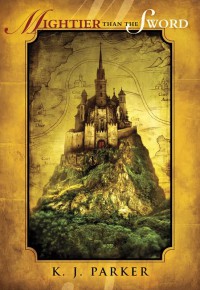

"Do you have to make a lot of decisions like that? I suppose you must do."
"All the time," I said. "And each one is truly bad. All that can be said for them is that the alternatives are even worse."
K.J. Parker is at his best in the novella, and, as always, I was captivated by the sharp wit and darkly ironic humor as well as the satirical worldbuilding and characters and finished the novella in a single reading session. Parker reminds me a bit of Wodehouse in the way he builds sympathy with the narrator through a chattering first-person narration. In this case, our narrator is an officer in a Rome-like empire whose ruling faction is beset by murderous intrigue-- think the Julio-Claudian era -- while also squabbling with and/or conquering its neighbors. In recent years, the empire has fallen prey to attacks by a mysterious unknown enemy with unknown goals and desires, and this enemy's ships have been seen again.
Capitulating to the orders of the emperor's wife--who also happens to be his aunt--our narrator sets off to help the various abbeys and monasteries to help shore up their defenses against the mysterious invaders.
While I think Parker is very gifted in characterization, he's not big on character development, which is one reason I so prefer his short fiction. In this case, we get plenty of time to get to know the narrator and his compatriots, including his romantic interest, without feeling stifled by the characers' staticness. The most rounded character, partially because the story is told in his voice, is the narrator himself. I found him highly sympathetic, a realist yet an optimist who is fond of books and sees himself as a coward despite his insistence on leading from the front.
As always, the story is a satire, and chock-full of quotable quotes. For example:
"Does it say something about the nature of the beast called Empire? The idea is that Empire protects the towns and villages and little farms from the enemy, and in order to do so recruits soldiers, so that the towns and villages and little farms won’t be laid waste, and grass won’t grow in abandoned streets and good productive land won’t be smothered in weeds and briars. But if the act of protection brings about the destruction it was designed to prevent— well. I’m not a trained philosopher, so I’m not qualified to comment."
If you're looking for a short, enjoyable novella with more than a tang of satire, then Mightier than the Sword is well worth a look.
~~I received this ebook through Netgalley from the publisher, Subterranean Press, in exchange for my honest review. Quotes were taken from an advanced reader copy and while they may not reflect the final phrasing, I believe they speak to the spirit of the novella as a whole.~~
Cross-posted on Goodreads

 3
3




